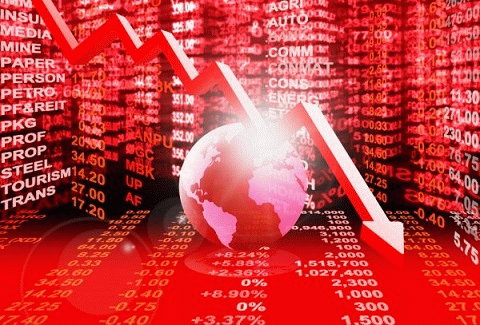There are three main reasons why stocks are falling hard.
1 Uncertainty. It's impossible for investors to gauge the economic impact of the rapidly-spreading coronavirus or its effect on stock prices. Investors buy stocks with the expectation that their investment will grow over time. In periods of crisis, when the environment becomes unfamiliar and opaque, expectations are crushed under the weigh of uncertainty. When expectations dampen, investors sell.
2 The Fed. Although investors have not faced a challenge like the coronavirus before, confidence in the Fed has remained surprisingly high. For the last 10 years, investors have seen multiple interventions by the Fed that were aimed at keeping Wall Street happy and stock prices high. Only recently have investors begun to doubt the Fed's ability to stop the market slide by slashing rates or increasing liquidity. As more investors realize that the Fed does not have the tools to address a supply shock, the selloff is likely to accelerate.
3Stock buybacks. In the last few years, stock prices have not been driven higher by institutional buyers or Mom and Pop investors. The rise is almost entirely attributable to share repurchases or stock buybacks as they are called. According to the Harvard Business Review, "In 2018 alone, with corporate profits bolstered by the Tax Cuts and Jobs Act of 2017, companies in the S&P 500 Index did a combined $806 billion in buybacks, about $200 billion more than the previous record set in 2007." Coronavirus is dramatically impacting corporate earnings projections and many analysts are predicting recession. Shrinking revenues and profits will put a damper on the jet-fuel that had been pushing stocks higher.
The Ball is in the Fed's Court
The pressure is building on the Fed to respond to the relentless 6-day stock market slide. In a Thursday article in the Wall Street Journal, former Fed governor Kevin Warsh appealed to the Fed to launch a coordinated response to the crisis with other central banks around the world. Here's an excerpt from the article:
"A central bank's primary job is to offset major disturbances to the economy. Today, the novel coronavirus is a material risk to the economy. It represents an unexpected shock, and the Federal Reserve should lead the world's central banks in taking immediate action.
In a coordinated move alongside the People's Bank of China, the European Central Bank, the Bank of England, the Bank of Japan and others so willing, the Fed should announce a 0.25-percentage-point interest-rate cut and make clear it's open-minded about further action. The Fed should also encourage other central banks to take appropriate simultaneous action to loosen monetary policy in their jurisdictions. Global action would help make the most of scarce policy ammunition.
More than a decade ago, then-Fed Chairman Ben Bernanke and his colleagues chose to act decisively. When confronted with a major economic shock, the Fed took extraordinary monetary-policy actions, often in coordination with other leading central banks. Acting sooner would have been better, but Mr. Bernanke's leadership at the Fed was exemplary. Less appreciated but no less important, the Fed benefited from a rich inheritance: a strong, highly credible institution replete with a large reservoir of interest rates to cut and a modest balance sheet with space to grow." ("The Fed Can't Wait to Respond to the Coronavirus", Wall Street Journal)
We think Kevin Warsh is being disingenuous. We think his plea is aimed at saving Wall Street not Main Street. Warsh is worried that the downdraft in stocks will trigger defaults by deeply-indebted financial institutions that will domino through the financial system severely impairing critical counterparties and precipitating another financial crisis. This is why is wants the Fed to act immediately even though he knows that interest rate cuts will have no material effect on a supply shock.
So what is a supply shock?
When the Fed slashes rates, it lowers the cost of money making it cheaper to borrow. When people or businesses borrow, they increase their spending which generates economic growth. This is how the Fed boosts demand by cutting rates. But rate cuts are not a panacea. They can't, for example, resolve supply-chain disruptions in China that have been brought on by the coronavirus outbreak. Many market participants have not yet grasped this fact. Simply put: The Fed does not have the tools to fix this problem. Therefore, confidence in the Fed to reverse the current selloff by cutting rates or adding liquidity is misplaced. It's misplaced because the approach will not work. If you are trying to fix your computer and the only tool you have is a sledgehammer, you are not going to have much success. This is the predicament the Fed is in.
Earlier this week, market analyst Mohamed El-Erian said, "Coronavirus cannot be countered by central bank policies". This is the critical fact that investors must realize before settling on a strategy. Financial Times journalist Katie Martin expanded on El-Erian's comments saying, "The expectation alone of monetary assistance may already be softening the blow"But anyone who can clearly articulate how easier policy can fix an economic pullback based on deaths, grounded flights, closed factories and ghost cities is very welcome to get in touch."
Good point, in other words, cheap money and boundless liquidity is not a cure-all. A can of 30-weight oil might keep your '98 Corolla running smoothly, but it's not going to help your head cold. It's simply not the right antidote. The Fed needs a remedy for supply disruptions, but doesn't have one. Here's more from an article at Marketwatch:
(Note: You can view every article as one long page if you sign up as an Advocate Member, or higher).






